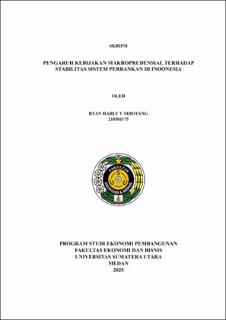Pengaruh Kebijakan Makroprudensial Terhadap Stabilitas Sistem Perbankan di Indonesia
The Impact of Macroprudential Policies on the Stability of the Banking System in Indonesia
Abstract
The stability of the banking system is a crucial pillar in maintaining national
economic resilience, especially amid ongoing global economic fluctuations. In this
context, macroprudential policies have become essential instruments implemented
by monetary authorities such as Bank Indonesia. This study aims to analyze the
impact of macroprudential policies, represented by Loan to Value (LTV), Reserve
Requirement (GWM), and Capital Adequacy Ratio (CAR), on the stability of the
banking system in Indonesia, as measured by the Z-Score. In addition, this study
includes control variables such as Return on Assets (ROA) and bank size (Size) to
enrich the analysis.
The data used is secondary panel data obtained from 25 publicly listed
conventional commercial banks in Indonesia during the period of 2014–2023. The
study employs dynamic panel regression analysis using the Generalized Method of
Moments (GMM) to address potential endogeneity issues. The findings indicate that
LTV has a negative and significant effect on the Z-Score, while both GWM and CAR
have positive and significant impacts. Bank size also shows a positive and
significant relationship with banking stability, whereas ROA exhibits a positive but
statistically insignificant effect.
These results suggest that strengthening liquidity and capital buffers
through macroprudential instruments can enhance banking system resilience, while
excessive credit expansion poses risks to stability. Therefore, this research
recommends that monetary authorities continue to reinforce supervisory
mechanisms and adjust policies in line with economic conditions. The study is
expected to contribute to evidence-based policymaking aimed at ensuring financial
system stability in Indonesia.
Collections
- Undergraduate Theses [2768]

